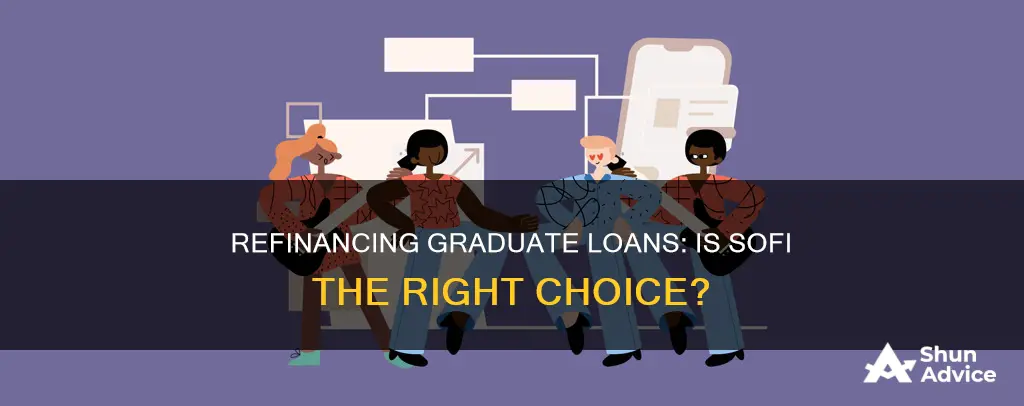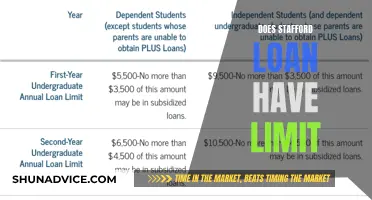
SoFi is an online lender that offers refinancing for student loans, including graduate loans. SoFi's refinancing options are aimed at borrowers who want plenty of benefits with their refinanced student loan. Refinancing graduate school loans can help lower interest rates and monthly payments, and consolidate multiple student loans into one. However, borrowers should be aware that refinancing federal loans with a private loan involves forfeiting federal benefits or protections.
| Characteristics | Values |
|---|---|
| Loan type | Private loan |
| Interest rate | Fixed rates starting as low as 4.49% APR with autopay |
| Eligibility | Previously enrolled in a degree-granting Title IV-accredited school |
| Minimum loan amount | $5,000 |
| Benefits | Flexible terms, competitive rates, no application or origination fees, no prepayment penalties |
| Credit check | Soft credit pull that does not affect your credit score |
| Refinancing options | Variable rate loans for 5, 7, 10, 15, and 20-year terms |
| Autopay discount | 0.25% interest rate reduction with monthly automatic deductions |
| Forbearance options | Natural disaster forbearance, temporary reduced payment, skip-a-payment |
| Deferment options | Academic and military deferment |
What You'll Learn

Pros and cons of refinancing graduate loans with SoFi
SoFi is a legitimate online lender that offers refinancing for graduate student loans. It is a leader in the student loan refinancing space. While refinancing your student loans with SoFi may have its benefits, there are also some drawbacks. Here are some pros and cons of refinancing graduate loans with SoFi:
Pros:
- SoFi offers refinancing for graduate student loans as low as $5,000.
- SoFi offers fixed rates starting as low as 4.49% APR with autopay.
- SoFi offers variable rate loans for 5, 7, and 10-year terms capped at 13.95% APR, and 15 and 20-year terms capped at 13.95% APR.
- SoFi allows borrowers to postpone payments if they return to school or are on active military duty.
- SoFi offers a reduced payment option, skip-a-payment, unemployment reduced payment option, and loan modifications.
- SoFi does not require a co-signer for refinancing.
- SoFi offers a fast, easy, and all-online refinancing process.
- SoFi does not charge any application or origination fees, or prepayment penalties.
Cons:
- When you refinance federal loans with SoFi, you forfeit your eligibility for all federal loan benefits, including flexible federal repayment and forgiveness options such as Public Service Loan Forgiveness (PSLF), Income-Based Repayment, Income-Contingent Repayment, extended repayment plans, and PAYE or SAVE.
- SoFi refinance loans are private loans and do not offer the same repayment options as federal loans, such as Income-Based Repayment or Income-Contingent Repayment.
- SoFi refinance loans do not offer deferment and forbearance options that are available with federal student loans.
- SoFi refinance loans may result in paying more interest over the life of the loan.
- SoFi conducts a soft credit pull initially, but if you continue your application, a hard credit pull will be performed, which may affect your credit score.
Seterus Loan Modifications: What You Need to Know
You may want to see also

Eligibility criteria for refinancing graduate loans with SoFi
SoFi offers refinancing for student loans, including for graduate students and medical/dental residents. To be eligible for refinancing, you must meet SoFi's eligibility criteria and underwriting criteria. Here are the key requirements:
Eligibility Criteria:
- Education Requirements: You must have previously enrolled in or graduated from a degree-granting Title IV-eligible school. The school must have been accredited by Title IV at the time of your matriculation.
- Loan Type: SoFi only refinances student loans that were used to fund your education. Loans that are currently being used to fund your education, such as for actively enrolled students, are not eligible for refinancing.
- Loan Amount: SoFi requires a minimum loan amount of $5,000. This amount may be higher in specific states due to legal requirements.
- Citizenship: You must be a U.S. citizen, a permanent resident, or a non-permanent resident alien. Non-permanent resident aliens, including DACA recipients and asylum seekers, must provide valid documentation of their current immigration status.
- Age: You must be at least the age of majority in your state of residence. If you are not, an age-of-majority cosigner is required.
Underwriting Criteria:
The underwriting criteria consider various factors, including your financial history, credit score, and monthly income versus expenses. SoFi offers competitive rates, with fixed rates starting as low as 4.49% APR with autopay.
It is important to note that if you refinance federal loans with SoFi, you will forfeit your eligibility for federal loan benefits, including flexible repayment and forgiveness options.
SBI Loan Closure: Early Exit Fees and Charges?
You may want to see also

Interest rates and monthly payments with SoFi
SoFi offers refinancing for student loans, including for graduate students. The interest rates and monthly payments for refinancing student loans with SoFi vary depending on the type of loan, the borrower's credit score, and the repayment plan.
SoFi offers both fixed and variable interest rates for refinancing student loans. Fixed rates start as low as 4.49% APR with autopay, while variable rates for 5, 7, and 10-year terms are capped at 13.95% APR, and 15 and 20-year terms are capped at 13.90% APR. SoFi also offers a 0.25% autopay interest rate reduction for borrowers who agree to make their monthly payments through automatic deductions from their savings or checking accounts. This discount will be lost for periods in which the borrower does not pay by automatic deduction. It is important to note that the discount will not reduce the monthly payment; instead, less interest will accrue each month, and more of the monthly payment will be applied to the principal loan balance.
The minimum monthly payment during the residency period is $100, which may not cover all the interest due each month, potentially resulting in negative amortization. SoFi also offers a reduced payment option for borrowers facing economic hardship. Additionally, SoFi provides a personal loan calculator on its website, allowing borrowers to estimate their monthly payments based on their new SoFi interest rate and the length of the loan.
It is worth noting that refinancing federal loans with SoFi means forfeiting eligibility for federal loan benefits, including flexible repayment and forgiveness options. SoFi refinance loans are private loans and do not offer the same repayment options as federal loans, such as Income-Based Repayment or PAYE.
In terms of eligibility, SoFi requires borrowers to have attended a Title IV-accredited school and been enrolled at least 50% of the time. Additionally, SoFi only refinances student loans totalling at least $5,000 that were used to fund tuition. To check the rates and terms for which a borrower qualifies, SoFi conducts a soft credit pull that does not affect their credit score. However, if the borrower proceeds with the application, SoFi will perform a hard credit pull, which may impact their credit.
Self Lender: Installment Loan Reporting and Your Credit
You may want to see also

Forfeiting federal benefits with SoFi refinancing
When considering refinancing your graduate school loans with SoFi, it's important to be aware that you will forfeit federal benefits and protections. Refinancing federal loans with a private loan from SoFi involves giving up access to certain benefits that are exclusive to federal loans. These benefits include flexible repayment plans and loan forgiveness programs offered by the federal government.
SoFi offers competitive fixed and variable rates for refinancing graduate school loans. By refinancing, you may be able to secure a lower interest rate, reducing your monthly payments and making it easier to pay off your loan faster. However, it's crucial to understand that refinancing with a private lender like SoFi means losing access to federal benefits. These benefits include income-driven repayment plans, such as Income-Based Repayment, Income-Contingent Repayment, and PAYE, which allow you to adjust your payments based on your income.
Additionally, refinancing with SoFi means forfeiting loan forgiveness programs such as Public Service Loan Forgiveness (PSLF). Federal loans also offer deferment and forbearance options that may not be available with private lenders. Forbearance and deferment allow borrowers to temporarily suspend their loan payments due to economic hardship, military service, or other reasons. If you anticipate needing these benefits in the future, refinancing with a private lender like SoFi may not be the best option for you.
While refinancing with SoFi has its advantages in terms of flexibility and potentially lower interest rates, it's important to carefully consider your financial goals and needs. Extending your loan term may result in paying more interest over the life of the loan. Therefore, it's recommended to explore all your options and understand the implications before deciding to refinance your graduate school loans with SoFi or any other private lender.
Sofi Private Loan Consolidation: What You Need to Know
You may want to see also

SoFi refinancing vs. student loan consolidation
SoFi is a legitimate online lender that offers refinancing for both federal and private student loans. It also offers private student loans for graduate students and undergraduates. SoFi's refinancing loan is best for borrowers who want plenty of benefits with their refinanced student loan.
SoFi's refinancing option is best for borrowers who want to lower their monthly payments, lower their interest rates, remove a cosigner, or switch from a fixed to a variable interest rate (or vice versa). The main reason not to refinance student loans is if you're currently using or plan to use federal benefits and protections, such as income-driven repayment plans, student loan forgiveness, deferment, and forbearance.
SoFi's refinancing option provides a range of benefits, including no application or origination fees, no prepayment penalties, and a 0.25% autopay interest rate reduction. The autopay discount requires agreeing to make monthly payments through automatic deductions from a savings or checking account. It's important to note that enrolling in autopay is not mandatory to receive a loan from SoFi.
On the other hand, student loan consolidation is a process where multiple federal education loans are combined into a single federal loan through a Direct Consolidation Loan offered by the U.S. Department of Education. Consolidation simplifies repayment by giving borrowers just one monthly bill to manage. Federal loans consolidated through a Direct Consolidation Loan retain their federal status and protections, such as deferment, forbearance, and forgiveness programs.
Consolidation and refinancing have some similarities, as they both ultimately aim to replace multiple existing student loans with a single new loan. However, it's important to understand the nuances of each option to make informed financial decisions.
Santander Loans: What You Need to Know
You may want to see also
Frequently asked questions
SoFi is a legitimate online lender that offers refinancing and private student loans.
Yes, SoFi offers refinancing for graduate students.
Refinancing with SoFi can help lower the interest rates on your loans and save money over the life of the loan. It can also help you consolidate multiple student loans into one monthly payment.
When you refinance a federal loan with a private loan from SoFi, you forfeit the benefits and protections of federal loans, such as income-driven repayment plans and loan forgiveness options.
To be eligible for refinancing with SoFi, you must have at least an associate degree from a Title IV accredited school. You must also meet SoFi's eligibility requirements, which include a minimum loan amount of $5,000.







